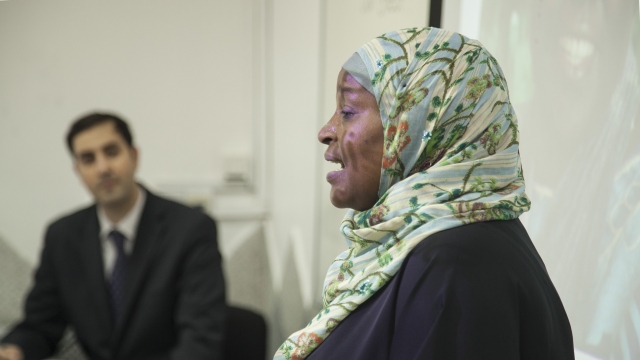November 9th, 2015: Wangari Kaminjo, a prominent environmentalist and niece of the late Wangari Maathai – the first female Nobel Peace Prize winner from Africa – has been speaking to students about the pioneering Green Belt Movement during a guest lecture at Canadian University Dubai (CUD).
In an impassioned speech about her homeland, Wangari talked about the gradual demise of the Kenyan rainforests and the initiative created by her aunt to help engage communities in restoring the country to glory, one step at a time.
The Green Belt Movement (GBM) was founded by Wangari Maathai in the late 1970s to address the growing problem of environmental degradation and deforestation, which had brought about wider consequences of food insecurity and fuel shortages.
GBM encouraged women in particular to work together to plant trees, store rainwater and produce food and firewood, and provided a token monetary payment to recognize their efforts. The movement grew throughout Kenya, and went on to tackle the country’s broader environmental, economic and even political concerns.
Discussing the stark realities of deforestation, Wangari revealed how Kenya’s landscape has been transformed in the past 50 years; from more than 70% forest coverage in the early 1960s, to just 5% today. Reflecting on this, she reinforced the importance of taking positive action, even at an individual level.
She said, “Never underestimate the power of one. All it takes is a single person to start, to make a movement grow. If you take care of your own land, your neighbours will be inspired to do the same. It’s as much about awareness raising as political pressure.”
Wangari recalled how her aunt used to take seeds wherever she went, trying to help communities as she travelled throughout the country, and how she upheld her sustainability principle of ‘need not want’ even in her affluence as a Nobel Peace Prize winner.
Concluding the lecture, Wangari revealed how she in now taking forward her aunt’s work through a project in Kenya that will transform a four-hectare piece of land into a vocational school for women, where they can learn skills that will support the long-term sustainability of their communities.
For students Serena Musa and Ghada Guergouv, the talk was an inspiration for them to take their own actions. Serena said, “Wangari reinforced the message that we only have one world, we all have a responsibility to take care of it, and that must start with ourselves and our own habits.”
Ghada added, “The message for me was that we must really think about the environmental consequences of everything we do, and particularly what we buy; is it a need, a must, or a whim?”
The guest lecture was organized by Mr. Ryan Sisson, member of faculty in the School of Environment and Health Sciences, who said, “Wangari gave us a very inspiring and energizing talk that really helped to bring the students’ classroom learning to life.”



